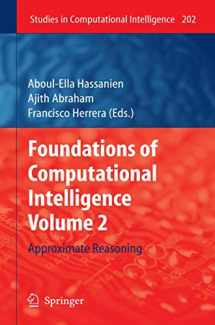
Foundations of Computational Intelligence Volume 2: Approximate Reasoning (Studies in Computational Intelligence, 202)
Book details
Summary
Description
Foundations of Computational Intelligence Volume 2: Approximation Reasoning: Theoretical Foundations and Applications Human reasoning usually is very approximate and involves various types of - certainties. Approximate reasoning is the computational modelling of any part of the process used by humans to reason about natural phenomena or to solve real world problems. The scope of this book includes fuzzy sets, Dempster-Shafer theory, multi-valued logic, probability, random sets, and rough set, near set and hybrid intelligent systems. Besides research articles and expository papers on t- ory and algorithms of approximation reasoning, papers on numerical experiments and real world applications were also encouraged. This Volume comprises of 12 chapters including an overview chapter providing an up-to-date and state-of-the research on the applications of Computational Intelligence techniques for - proximation reasoning. The Volume is divided into 2 parts: Part-I: Approximate Reasoning – Theoretical Foundations Part-II: Approximate Reasoning – Success Stories and Real World Applications Part I on Approximate Reasoning – Theoretical Foundations contains four ch- ters that describe several approaches of fuzzy and Para consistent annotated logic approximation reasoning. In Chapter 1, “Fuzzy Sets, Near Sets, and Rough Sets for Your Computational Intelligence Toolbox” by Peters considers how a user might utilize fuzzy sets, near sets, and rough sets, taken separately or taken together in hybridizations as part of a computational intelligence toolbox. In multi-criteria decision making, it is necessary to aggregate (combine) utility values corresponding to several criteria (parameters).


We would LOVE it if you could help us and other readers by reviewing the book
Book review



